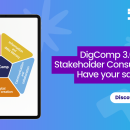New stakeholder consultation on the European Digital Competence Framework for Citizens (DigComp) - Have your say!
Dear DSJP Community,
In April 2025, the European Commission's Joint Research Centre (JRC) is launching a stakeholder consultation on the European Digital Competence Framework for Citizens (DigComp). This major development, a collaboration with the Directorate-General for Employment, Social Affairs and Inclusion, will lead to DigComp version 3.0 towards the end of 2025.
JRC scientists and experts have worked on new elements to update the framework. The consultation will seek feedback from individuals and organisations interested in digital skills (competences), such as:
Educators and school leaders in primary, secondary, higher education and VET institutions
Learning providers
Academics and researchers
Business sector organisations
Employment services
Civil society organisations (NGOs, professional associations, etc.)
Government and public organisations.
To achieve the best possible outcome and make the framework useful for all stakeholders, the European Commission call for as wide a participation as possible by all the actors concerned with digital skills and competences.
In advance of the consultation, registered participants will receive a short background document illustrating the main proposed changes. There will also be an opportunity to provide written feedback.
Interested participants can choose to register for one of two identical online sessions (in English):
Thursday, April 10, 14:30-16:00 (UTC+1)
Friday, April 11, 10:00-11:30 (UTC+1)
If you cannot attend the sessions on April 10 or 11, but you want to provide feedback, please indicate this in the registration form, and we will send you information on how you can take part.
To take part, please register at this link.
Further information on DigComp
Digital Competence Framework for Citizens (DigComp) - European Commission
DigComp was first published in 2013, and last updated in 2022 as DigComp 2.2. It describes the digital knowledge, skills and attitudes that are relevant to citizens, in daily life, to learn, to work and to participate in society.
DigComp is used across Europe and beyond for a range of purposes related to the development of digital competence. These include designing, implementing and reviewing policies, curricula, education and training programmes, assessment, certification, qualifications frameworks, and analysis of digital skills supply and demand.


